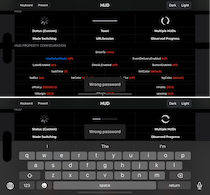English | 简体中文
This is a lightweight and easy-to-use HUD designed to display the progress and status of ongoing tasks on iOS and tvOS.
- iOS 12.0+
- tvOS 12.0+
- Xcode 14.1+
- Swift 5.7.1+
If you are using the Swift Package Manager, add a dependency to your Package.swift file and import the HUD library into the desired targets:
dependencies: [
.package(url: "https://github.com/liam-i/FlyHUD.git", from: "1.5.12")
],
targets: [
.target(
name: "MyTarget", dependencies: [
.product(name: "FlyHUD", package: "FlyHUD"), // Optional
.product(name: "FlyProgressHUD", package: "FlyHUD"), // Optional
.product(name: "FlyIndicatorHUD", package: "FlyHUD") // Optional
])
]If you are using Xcode, then you should:
- File > Swift Packages > Add Package Dependency
- Add
https://github.com/liam-i/FlyHUD.git - Select "Up to Next Minor" with "1.5.12"
Tip
For detailed tutorials, see: Apple Docs
If you're using CocoaPods, add this to your Podfile:
source 'https://github.com/CocoaPods/Specs.git'
# Or use CND source
# source 'https://cdn.cocoapods.org/'
platform :ios, '12.0'
use_frameworks!
target 'MyApp' do
# Use the FlyHUD, FlyIndicatorHUD and FlyProgressHUD components.
pod 'FlyHUD', '~> 1.5.12'
# Or, just use the FlyHUD component.
pod 'FlyHUD', '~> 1.5.12', :subspecs => ['FlyHUD']
# Or, just use the FlyHUD and FlyIndicatorHUD components.
pod 'FlyHUD', '~> 1.5.12', :subspecs => ['FlyIndicatorHUD']
# Or, just use the FlyHUD and FlyProgressHUD components.
pod 'FlyHUD', '~> 1.5.12', :subspecs => ['FlyProgressHUD']
endAnd run pod install.
Important
CocoaPods 1.13.0 or newer is required.
If you're using Carthage, add this to your Cartfile:
github "liam-i/FlyHUD" ~> 1.5.12And run carthage update --platform iOS --use-xcframeworks.
Using HUD in your application is very simple.
- Displays the status HUD of an indeterminate tasks:
let hud = HUD.show(to: view)
DispatchQueue.global().async {
// Do something...
DispatchQueue.main.async {
hud.hide()
}
}- Displays a task's progress HUD:
let hud = HUD.show(to: view, mode: .progress(), label: "Loading")
Task.request { progress in
hud.progress = progress
} completion: {
hud.hide()
}- Displays a text-only status HUD:
HUD.showStatus(to: view, label: "Wrong password")- Displays a custom view's status HUD. e.g. a UIImageView:
HUD.showStatus(to: view, mode: .custom(UIImageView(image: UIImage(named: "Checkmark")?.withRenderingMode(.alwaysTemplate))), label: "Completed")- Displays a custom view's status HUD. And the UIImageView is on the left:
HUD.showStatus(to: view, mode: .custom(UIImageView(image: UIImage(named: "warning"))), label: "You have an unfinished task.") {
$0.contentView.indicatorPosition = .leading
}- Sets the animation that should be used when showing and hiding the HUD. E.g. style, duration, spring damping:
HUD.showStatus(to: view, using: .animation(.slideUpDown, damping: .default, duration: 0.3), label: "Wrong password")- Enable keyboard layout guide to track the keyboard's position in your app’s layout:
HUD.showStatus(to: view, label: "You have a message.") {
$0.keyboardGuide = .center()
}Warning
HUD is a UI class and should therefore only be accessed on the main thread.
For more examples, including how to use the HUD with asynchronous operations such as URLSession, and how to customize the HUD style, take a look at the bundled example project. Extensive API documentation is available here.
To run the example project, first clone the repo, then cd to the root directory and run pod install. Then open HUD.xcworkspace in Xcode.
The documentation for releases and main are available here:
The name FlyHUD combines Fly and HUD and stands out for its simplicity and expressiveness. Fly implies fast, efficient and flexible meaning, which is consistent with the real-time and immediacy of HUD. Overall, FlyHUD expresses the ability of HUD to present information and data quickly and efficiently.
- Thanks a lot to Jonathan George for building MBProgressHUD - all ideas in here and many implementation details were provided by his library.
- Thanks a lot to Vinh Nguyen for building NVActivityIndicatorView - many implementation details of the loading animations here are provided by his library.
- Thanks a lot to Related Code for building ProgressHUD - many implementation details of the loading animations here are provided by his library.
FlyHUD is available under the MIT license. See the LICENSE file for more info.















